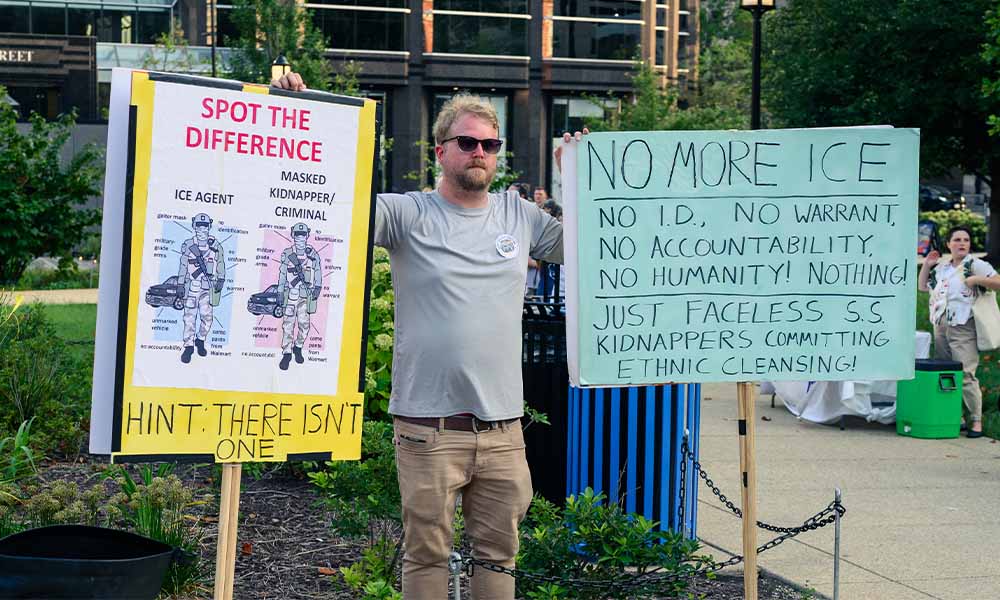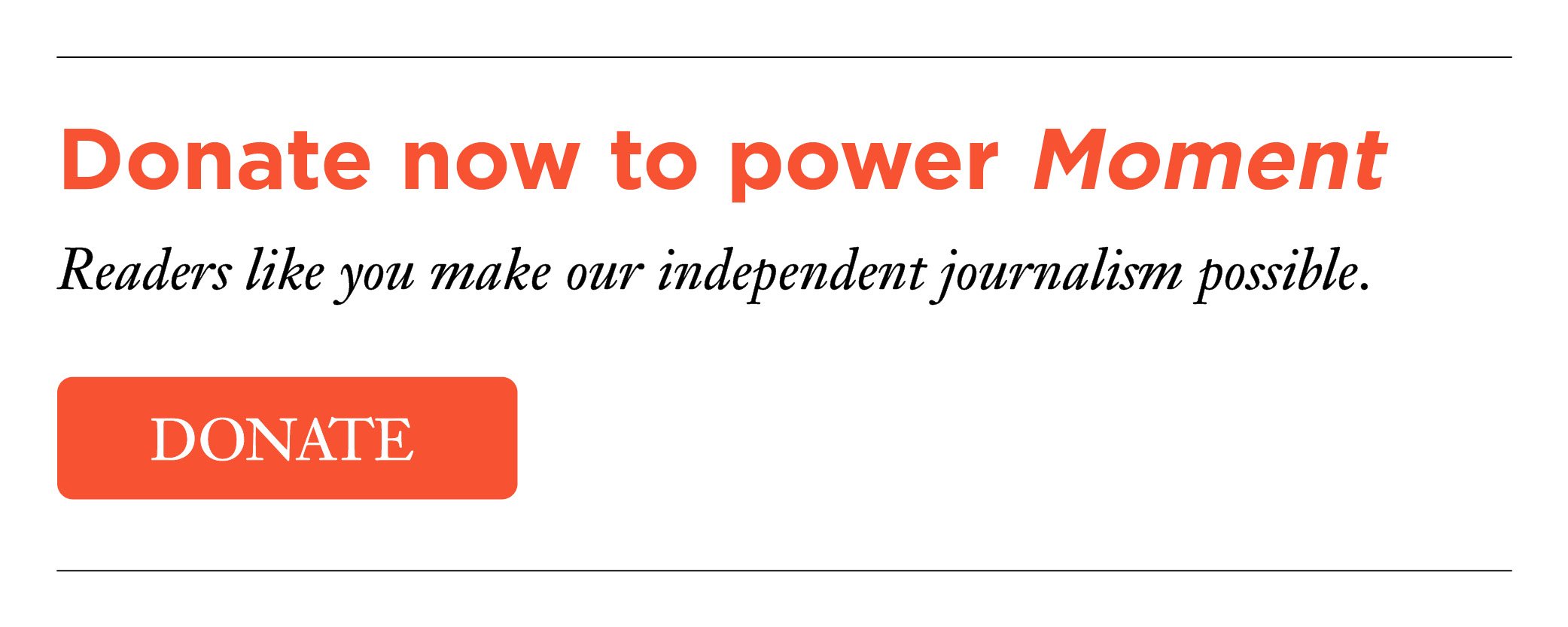A Jewish Response to ICE: Lessons from an Occupied French Village
Providing support to ICE detainees and family members waiting to see them is just one way to step up.

My mother spent her early childhood in a German-occupied French village during World War II. She and her parents lived underground as Catholics, protected by the French Resistance. My mother did not know she was Jewish until 1947 when, at the age of nine, she arrived safely in New York Harbor.
This family history has come to mind as I’ve watched the Trump administration’s brutal, often-lawless arrest, detention and deportation of immigrants from Latin America and elsewhere. What is going on now in the United States is nowhere near as severe—at least not yet—as what happened to Jews, Roma, communists, gay people and other victims of Nazi persecution. But there are common themes, most notably the scapegoating of “foreignness” as part of a larger attempt to inflame xenophobia and consolidate autocratic power.
Jews, in my view, have a special responsibility to oppose this kind of oppression. We know better than most where it can lead.
My family’s experience as immigrants—first in France and then in the United States—has made me reflect further on what American Jews can do in response to what we’re seeing in our country.
My mother, Paulette Singer Barrett, was born in 1937 in France. Her parents had met in Poland and migrated years earlier to Paris. Most other members of my grandparents’ large extended families remained in Poland and eventually were slaughtered by the Nazis or their local henchmen.
What’s currently needed is not the death-defying heroism of the French Resistance; rather, what we must avoid is the cowardice of the Vichy collaborators.
Once the war started, my grandparents failed in several attempts to escape to the United States and ended up in the small occupied city of Le Puy in the Auvergne region, known for lentils and ancient churches. They were lucky. Le Puy sheltered scores of Jewish families. A local wealthy family employed my grandfather in their lace factory and sent him out of town when the Gestapo came through.
The true heroes of Le Puy were a married couple named Marcel and Marcelle Fachaux. Marcel was the police chief in charge of the Jewish list. In fact, he was a member of the Resistance and provided Jews, including immigrant Jews like my grandparents, with false papers. His wife, Marcelle, ran the telegraph office. She kept the Resistance up to date on German troop movements. My mother witnessed the liberation of Le Puy in 1945, when Resistance fighters emerged from the forest and overran the local German garrison.
My grandparents never really recovered from the war. Grief and bitterness seemed to dominate their decades in the United States, and when I was a child, we rarely spoke about their history.
In the 1990s, after my grandparents had died, my mother invested enormous energy over many years to reconstruct her childhood experiences, taking research trips to Paris and Le Puy and ultimately assembling the evidence necessary to see that Marcel and Marcelle Fachaux were recognized for their heroism, their names engraved on a stone wall in the Garden of the Righteous in Yad Vashem.
So, what lessons does this tale of survival in occupied France offer to us today in the United States? What obligations does it place on us, or on me?
Our circumstances, to be sure, are not as dire as those in 1940s Le Puy, but we face choices similar to those that confronted the French: to look away from—and therefore enable—dark forces seeking to heighten intolerance and divisiveness or confront and oppose those forces. Now is the time to act, before the slide toward persecution and autocracy further accelerates. What’s currently needed is not the death-defying heroism of the French Resistance; rather, what we must avoid is the cowardice of the Vichy collaborators.
Members of the New Jersey synagogue to which my wife and I belong, Temple Ner Tamid, have joined progressive Christian activists and immigration rights advocates to stand vigil on a regular basis at a privately run Immigration and Customs Enforcement (ICE) detention center in Newark, NJ. We hold protest signs and offer moral support to the relatives of detainees who line up and wait—often for many hours—to visit their relatives inside. They need water and snacks. Some require clothing that meets the detention center’s arbitrary dress code for visitors: closed-toe shoes, for women pants that reach the ankle.
On another front, HIAS, originally known as the Hebrew Immigrant Aid Society, provides a wide array of legal and other support services for refugees from all over the world. Their work includes pairing non-lawyer volunteers with refugees seeking permanent status in the United States, as the newcomers navigate confusing court hearings and other government proceedings.
I received excellent volunteer training from HIAS staff members who then referred me to a grassroots immigrant-aid network based at Metro Baptist Church in Manhattan, where I have been mentoring a young man from Guinea who is learning English, studying for the GED exam and taking steps with the help of pro bono counsel toward obtaining a green card. I have every confidence that if given an opportunity to find a foothold in the United States, my mentee will contribute energy and enthusiasm, not to mention tax dollars, to American society. His ambition is to go to college and become an architect.
Seeking to provide aid and comfort to immigrants under duress can lead to higher-risk choices. In June, New York City Comptroller Brad Lander defied masked ICE agents when they arrested an immigrant Lander had accompanied to a court hearing. Demanding loudly whether the agents had a judicial warrant for the arrest, Lander himself was handcuffed and detained for several hours. The episode sparked media attention and popular backlash across the city and country. Ultimately, ICE, which claimed that Lander had assaulted agents despite video evidence to the contrary, released him without charges. He returned to immigration court just a few days later, once again to bear witness to proceedings there.
Without leaving home, concerned citizens can organize calls to their legislators, state and federal, and work virtually toward reversing the ascendance of the MAGA movement and its policies. In New Jersey, this can include supporting recently introduced state legislation to ban law enforcement officers, including ICE agents, from operating anonymously by wearing masks. One can also participate in door-to-door canvassing already underway for off-year elections, such as the New Jersey governor’s race, in which U.S. Representative Mikie Sherrill is running against a Trump-endorsed opponent. And, of course, the 2026 midterm congressional elections are just around the corner.
Trump’s anti-immigrant bigotry—reflected in his repeated echoing of Nazi rhetoric about foreigners “poisoning the blood” of American society—is not the only reason to work toward defeating MAGA. But it is one that should compel the attention of American Jews and move us to action.
A former journalist with The Wall Street Journal and Bloomberg Businessweek magazine, Paul Barrett is an adjunct professor at the NYU School of Law and a volunteer immigrant mentor with the New York grassroots group Resources, Opportunities, Connections and Community.
Top image credit: Geoff Livingston (CC BY-SA 4.0)



2 thoughts on “A Jewish Response to ICE: Lessons from an Occupied French Village”
The article’s title including “MAGA’s anti-immigrant bigotry” tells one the article is a woke hit piece.
I will respond to this comment in a similarly terse and concise manner. It is a “MAGA hit piece, ” devoid of any interest in or concern for the real human beings whose lives are being destroyed by the Draconian measures enacted by our current leaders.